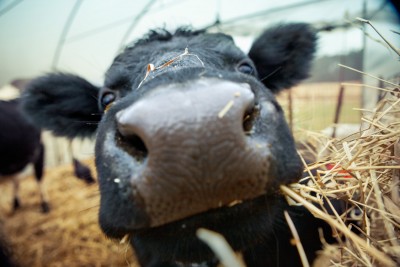Ration Balancing for Beef Cattle
Amy Barkley, Livestock Specialist
Southwest New York Dairy, Livestock and Field Crops Program

Beef nutrition is more than just providing the cattle with feedstuffs. While beef animals can do well, even thrive, on diets that are as simple as baled forage and/or pasture and mineral supplements, feeding in a precise manner can help improve rates of gain, body condition, finishing quality, and result in an animal that is more ideally suited for market. Feeding this way may also offer an added benefit of cost savings, since balanced rations allow a producer to feed to the animals' needs, rather than potentially over or under providing different nutrients. Balanced rations are diverse, tailored to each operation, and can be as simple as forage and quality mineral supplement, or more complex with the addition of concentrates such as corn or soybeans.
Prior to building any beef ration, knowing the quality of the dietary components you have available is important. First, assess that the components are free of any molds, rots, or unwanted inclusions (such as metal in baled forage or toxic weeds in a pasture). The next step is to have the feed components tested for their nutritional composition. Because forage is a large part of many producers' diets, and if testing only one component is realistic, forage should be the priority. Forage is highly variable in its nutrient composition, since it can be easily impacted by factors including plant species, plant age, weather, and harvest technique. Taking samples of baled forage or pasture and sending them to a reputable lab for nutritional testing will provide you with information needed to balance your ration, including values of TDN (total digestible nutrients) and CP (crude protein).
Rations for beef cattle will differ based on factors including breed, age, sex, herd composition, and time of year. Nutritional requirements for each age and stage have been compiled in the publication, "Nutrient Requirements of Beef Cattle", which is updated regularly and published by the National Research Council (NRC). These numbers provide the basis for many of the recommendations given by beef nutritionists and research scientists.
Balancing rations can be done through a nutritionist, or can be done on your own. Two free online tools, developed by Oklahoma State University, can aid in the balancing of diets using Excel spreadsheets. Both can be found through this link: http://beefextension.okstate.edu/pages/calculators. The "OSU COWCULATOR" manages the dietary needs of cattle in maintenance (adults). This program is based on research data as well as NRC requirements. The second tool, "OSU Ration Calculator 2013", can also be used to balance a ration to NRC requirements, while allowing slightly more flexibility than the first tool. For either of these spreadsheets, knowing the actual intake of the cattle you are formulating for will allow for the most accurate formulation, since nutrient values for a diet are partially based on intake. It should be noted that the "OSU COWCULATOR" only allows feed to be entered on an as-fed basis, while the "OSU Ration Calculator 2013" allows for feed to be entered on both an as-fed or dry matter basis.
If you need aid in testing your feed components or using the tools above to balance rations, contact your local extension agent!
Upcoming Events
IPM Strategies to Protect Corn and Soybean Seed in NY
July 30, 2025
Hamburg , NY
SWNYDLFC and Cornell IPM are hosting a grower meeting to discuss integrated pest management strategies for protecting corn and soybean seed in New York.
FAMACHA Training for Sheep and Goat producers in Woodhull NY
August 13, 2025 : FAMACHA Training in Woodhull
Woodhull, NY
Join us for a discussion and hands-on training for internal parasite integrated pest management in sheep and goats. Certification is available to all students participating in the workshop.
Cover Crop & Soil Health Field Day
August 13, 2025
Andover, NY
Please join us for a morning of hands-on learning with expert insights from local farmers, industry representatives, and extension. We will have some demonstration plots in action along with discussion about how cover crops influence soils and demonstration showing impacts on farm resiliency.
Announcements
No announcements at this time.





